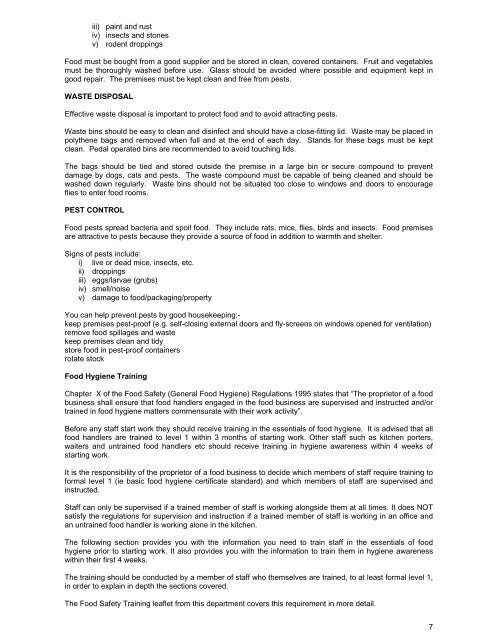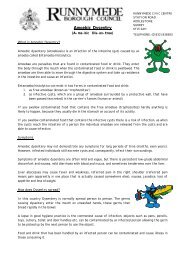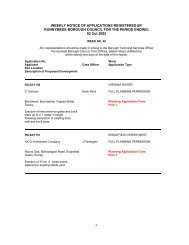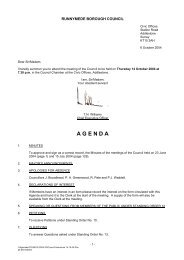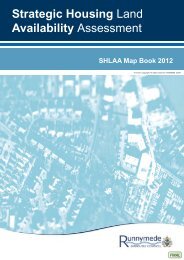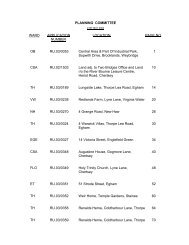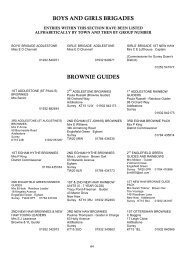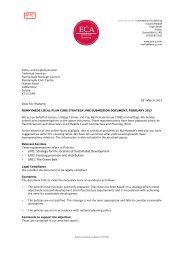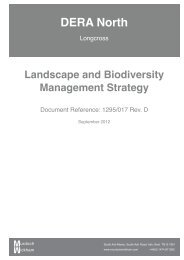Food Safety HACCP
Food Safety HACCP
Food Safety HACCP
Create successful ePaper yourself
Turn your PDF publications into a flip-book with our unique Google optimized e-Paper software.
iii) paint and rust<br />
iv) insects and stones<br />
v) rodent droppings<br />
<strong>Food</strong> must be bought from a good supplier and be stored in clean, covered containers. Fruit and vegetables<br />
must be thoroughly washed before use. Glass should be avoided where possible and equipment kept in<br />
good repair. The premises must be kept clean and free from pests.<br />
WASTE DISPOSAL<br />
Effective waste disposal is important to protect food and to avoid attracting pests.<br />
Waste bins should be easy to clean and disinfect and should have a close-fitting lid. Waste may be placed in<br />
polythene bags and removed when full and at the end of each day. Stands for these bags must be kept<br />
clean. Pedal operated bins are recommended to avoid touching lids.<br />
The bags should be tied and stored outside the premise in a large bin or secure compound to prevent<br />
damage by dogs, cats and pests. The waste compound must be capable of being cleaned and should be<br />
washed down regularly. Waste bins should not be situated too close to windows and doors to encourage<br />
flies to enter food rooms.<br />
PEST CONTROL<br />
<strong>Food</strong> pests spread bacteria and spoil food. They include rats, mice, flies, birds and insects. <strong>Food</strong> premises<br />
are attractive to pests because they provide a source of food in addition to warmth and shelter.<br />
Signs of pests include:<br />
i) live or dead mice, insects, etc.<br />
ii) droppings<br />
iii) eggs/larvae (grubs)<br />
iv) smell/noise<br />
v) damage to food/packaging/property<br />
You can help prevent pests by good housekeeping:-<br />
keep premises pest-proof (e.g. self-closing external doors and fly-screens on windows opened for ventilation)<br />
remove food spillages and waste<br />
keep premises clean and tidy<br />
store food in pest-proof containers<br />
rotate stock<br />
<strong>Food</strong> Hygiene Training<br />
Chapter X of the <strong>Food</strong> <strong>Safety</strong> (General <strong>Food</strong> Hygiene) Regulations 1995 states that “The proprietor of a food<br />
business shall ensure that food handlers engaged in the food business are supervised and instructed and/or<br />
trained in food hygiene matters commensurate with their work activity”.<br />
Before any staff start work they should receive training in the essentials of food hygiene. It is advised that all<br />
food handlers are trained to level 1 within 3 months of starting work. Other staff such as kitchen porters,<br />
waiters and untrained food handlers etc should receive training in hygiene awareness within 4 weeks of<br />
starting work.<br />
It is the responsibility of the proprietor of a food business to decide which members of staff require training to<br />
formal level 1 (ie basic food hygiene certificate standard) and which members of staff are supervised and<br />
instructed.<br />
Staff can only be supervised if a trained member of staff is working alongside them at all times. It does NOT<br />
satisfy the regulations for supervision and instruction if a trained member of staff is working in an office and<br />
an untrained food handler is working alone in the kitchen.<br />
The following section provides you with the information you need to train staff in the essentials of food<br />
hygiene prior to starting work. It also provides you with the information to train them in hygiene awareness<br />
within their first 4 weeks.<br />
The training should be conducted by a member of staff who themselves are trained, to at least formal level 1,<br />
in order to explain in depth the sections covered.<br />
The <strong>Food</strong> <strong>Safety</strong> Training leaflet from this department covers this requirement in more detail.<br />
7


